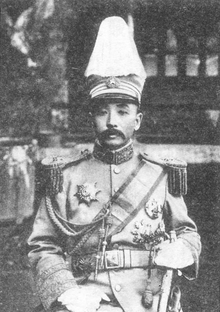

Generalissimo of the Military Government of China
19 March 1875 Haicheng, Liaoning, Qing Dynasty
4 June 1928(1928-06-04) (53) Shenyang, Liaoning, Republic of China
18 June 1927 – 4 June 1928
Chinese warlord and politician (1875-1928) Zhang Zuolin張作霖Zhang in the 1920sGeneralissimo of the Military Government of ChinaIn office 18 June 1927 – 4 June 1928Preceded by Wellington Koo (as acting President)Succeeded by Tan Yankai (as Chairman of the National Government)Warlord of ManchuriaIn office 1922 – 4 June 1928Succeeded by Zhang Xueliang Personal detailsBorn(1875-03-19 ) 19 March 1875 Haicheng, Liaoning, Qing DynastyDied4 June 1928(1928-06-04) (aged 53) Shenyang, Liaoning, Republic of ChinaCause of deathAssassinationNationalityChinesePolitical partyFengtian cliqueSpouse(s) Zhao Chungui Lu Shouxuan Children14, including: Zhang Xueliang Zhang Xueming Zhang Xuezheng Zhang Xuesi Zhang Xuesen AwardsOrder of Rank and Merit Order of the Golden Grain Order of Wen-HuMilitary serviceNickname(s)Old Marshal Rain Marshal Mukden TigerAllegiance Qing dynasty Republic of China Fengtian clique Years of service1900–1928RankGrand Marshal of the Republic of China, GeneralissimoBattles/wars First Sino-Japanese War Boxer Rebellion Xinhai Revolution First Zhili–Fengtian War Second Zhili–Fengtian War Northern Expedition (DOW) Zhang Zuolin (simplified Chinese: 张作霖 ; traditional Chinese: 張作霖 ; pinyin: Zhāng Zuòlín ; Wade–Giles: Chang Tso-lin ; 19 March 1875 – 4 June 1928) was an influential Chinese bandit, soldier, and warlord during the Warlord Era in China. The warlord of Manchuria from 1916 to 1928, and the military dictator of the Republic of China in 1927 and 1928, he rose from banditry to power and influence. Backed by Japan, Zhang successfully influenced politics in the Republic of China during the early 1920s. In fall of 1924 during the Second Zhili–Fengtian War, he invaded and gained control of Peking, including the internationally recognized government, in April 1926. His appointment as grand marshal of the Republic of China in June 1927 represented the height of his success, but was quickly followed by defeat: the economy of Manchuria, the basis of his power, was overtaxed by his adventurism and collapsed in the winter of 1927; and he was defeated by the National Revolutionary Army of the Kuomintang under Generalissimo Chiang Kai-shek in May 1928. Leaving Beijing in early June to return to Manchuria, he was killed by a bomb planted by infuriated Kwantung Army officers on 4 June 1928; his brief reign presaged the end of Chinese warlordism by December. His assassination by members of the Japanese Kwantung Army made way for the eventual invasion of Manchuria.

We use cookies
We use cookies and other tracking technologies to improve your browsing experience on our website, to show you personalized content and targeted ads, to analyze our website traffic, and to understand where our visitors are coming from. Privacy Policy.